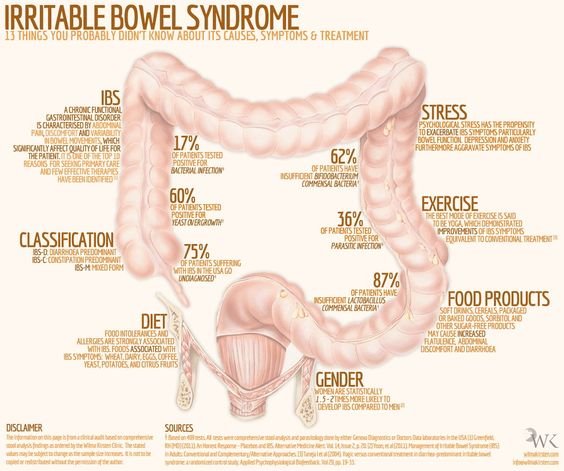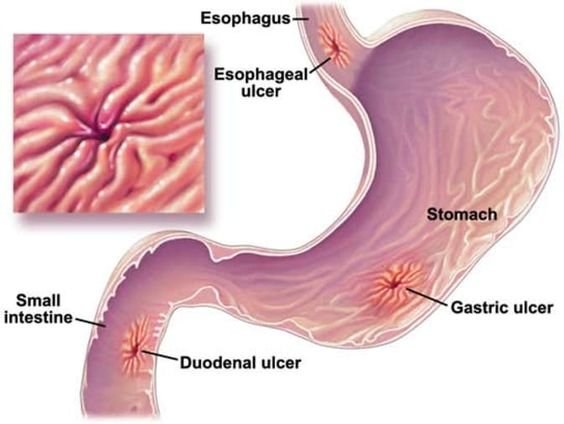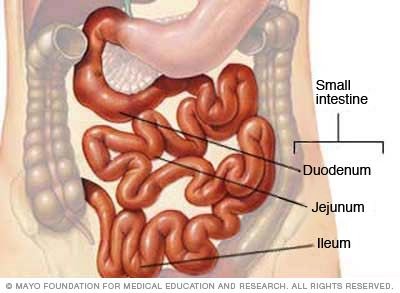Irritable Bowel Syndrome – Overview. Irritable bowel syndrome (IBS) is a common disorder that affects the stomach and intestines, also called the gastrointestinal tract. Symptoms include cramping, abdominal pain, bloating, gas, diarrhea constipation, or both. IBS is a chronic condition that you’ll need to manage long term.
Irritable bowel syndrome (IBS) is a common disorder that affects the stomach and intestines, also called the gastrointestinal tract. Symptoms include cramping, abdominal pain, bloating, gas, diarrhea constipation, or both. IBS is a chronic condition that you’ll need to manage long term.
Only a small number of people with IBS have severe symptoms. Some people can control their symptoms by managing their diet, lifestyle, and stress. More severe symptoms can be treated with medication and counseling.

Irritable Bowel Syndrome Diet
There’s no single diet or medicine that works for everyone with IBS. But there are lots of things that can help if you have been diagnosed with it.
Don’t
- do not delay or skip meals
- do not eat too quickly
- do not eat lots of fatty, spicy or processed foods
- do not eat more than 3 portions of fresh fruit a day (a portion is 80g)
- do not drink more than 3 cups of tea or coffee a day
- do not drink lots of alcohol or fizzy drinks
Do
- cook homemade meals using fresh ingredients when you can
- keep a diary of what you eat and any symptoms you get – try to avoid things that trigger your IBS
- try to find ways to relax
- get plenty of exercise
- try probiotics for a month to see if they help
Causes
The reasons why IBS develops are not clear. It can occur after a bacterial infection or a parasitic infection (giardiasis) of the intestines. This is called postinfectious IBS. There may also be other triggers, including stress.
The intestine is connected to the brain by hormones and nerve signals that go back and forth between the bowel and the brain. These signals affect bowel function and symptoms. The nerves can become more active during stress. This can cause the intestines to be more sensitive and contract more.
Learn more about How to Increase Platelet Count Naturally
IBS can occur at any age. Often, it begins in the teen years or early adulthood. It is twice as common in women as in men. It is less likely to begin in people above 50 years of age.
About 10% to 15% of people in the United States have symptoms of IBS. It is the most common intestinal problem that causes people to be referred to a bowel specialist (gastroenterologist).

Symptoms
IBS symptoms vary from person to person, and range from mild to severe. Most people have mild symptoms. You are said to have IBS when symptoms are present for at least 3 days a month for a period of 3 months or more.
The main symptoms include:
- Abdominal pain and cramps
- Gas
- Fullness
- Bloating
- Change in bowel habits. You can have either diarrhea (IBS-D), or constipation (IBS-C).
When to see a doctor
See your health care provider if you have a persistent change in bowel habits or other symptoms of IBS. They may indicate a more serious condition, such as colon cancer. More-serious symptoms include:
- Weight loss
- Diarrhea at night
- Rectal bleeding
- Iron deficiency anemia
- Unexplained vomiting
- Pain that isn’t relieved by passing gas or a bowel movement

What is the best way to get rid of IBS?
Lifestyle and home remedies
- Experiment with fiber. Fiber helps reduce constipation but also can worsen gas and cramping.
- Avoid problem foods. Eliminate foods that trigger your symptoms.
- Eat at regular times. …
- Exercise regularly.
What is the main cause of irritable bowel syndrome?
The reasons why IBS develops are not clear. It can occur after a bacterial infection or a parasitic infection (giardiasis) of the intestines. This is called postinfectious IBS. There may also be other triggers, including stress.
What are 3 symptoms of IBS?
IBS symptoms
- abdominal (stomach) pain and cramping, which may be relieved by moving your bowels.
- a change in your bowel habits – such as diarrhea, constipation, or sometimes both.
- bloating and swelling of your stomach.
- excessive wind (flatulence)
- occasionally experiencing an urgent need to move your bowels.
Learn more about Home Remedies for Constipation
What are the 4 stages of IBS?
There are four subcategories of IBS, each with equal prevalence:
- Mostly diarrhea and abdominal discomfort (IBS-D).
- Mostly constipation and abdominal discomfort (IBS-C).
- Alternating loose stools and constipation with abdominal discomfort (IBS-mixed).
- Undefined subtype (IBS-U) — symptoms vary.
Is yogurt good for IBS?
A recent study showed that consuming 2 to 3 cups of homemade yogurt – containing Lactobacillus – on a daily basis leads to the complete relief of IBS symptoms along with 1-2 normal bowel movements daily. Out of the 189 IBS patients in the study, 169 achieved complete improvement of symptoms within 6 months.
Learn more about Frequent Urination Problem
Are bananas good for IBS?
This means people with IBS can safely consume a serving of medium-sized firm yellow or green bananas daily without triggering gastrointestinal symptoms. However, ripe bananas, which have higher levels of fermentable carbohydrates called fructans, can trigger IBS symptoms in some people.
What foods to avoid with IBS?
5 Foods to Avoid if You Have IBS
- Milk. Milk and other foods that contain lactose, like cheese and ice cream, can cause gas and bloating in people who are lactose intolerant. …
- Foods High in Fructose.
- Carbonated Beverages.
- Caffeine.
- Sugar-free Chewing Gums.
Can IBS naturally go away?
There isn’t a cure for IBS. However, there is a treatment that can help control your symptoms. An integrative approach may include mind-body techniques; dietary changes, like the low FODMAP diet; nutritional supplements; over-the-counter and prescription medications; and physical activity and exercise.

How can I test for IBS at home?
IBSchek and IBS-Smart are two at-home blood tests that can help in the diagnostic process for IBS. Both tests measure anti-CdtB and anti-vinculin. These are antibodies associated with IBS-D and IBS-M that can develop from gastrointestinal infections, such as food poisoning.
Learn more about Oily Skin Care Tips at Home
What foods help calm IBS?
Summary. You can ease your IBS symptoms by eating a balanced diet that is low in FODMAPs and saturated fat. These include lean meats, eggs, fatty fish, leafy greens, nuts, seeds, and fruits that are lower in sugar. Fermented foods may also be good for the gut flora if you have IBS.
Can IBS be cured?
Living with irritable bowel syndrome, or IBS, can be challenging. IBS symptoms, such as stomach pain, diarrhea, gas, and bloating, often interfere with your life. But IBS is manageable. Though there is no cure, you can improve symptoms through diet and lifestyle changes.
How long does Irritable Bowel Syndrome(IBS) last?
Generally, a flare up of irritable bowel syndrome can last from a few hours to several days. However, it is not uncommon for some people to experience symptoms for weeks or even longer. Factors such as stress, diet, medication, and lifestyle can all contribute to the length and severity of an IBS flare up.
Can IBS start suddenly?
Yes, it is possible to develop IBS suddenly. A common cause for this is an infection in the digestive system, such as a stomach bug. This can lead to a condition known as postinfectious IBS after the infection resolves. It is also possible for a person to have a chronic or ongoing infection that mimics IBS.
What fruit is good for IBS?
What to eat with IBS
- low FODMAP fruits, such as cantaloupe, coconut, rambutan, lychee, oranges, and guava.
- low FODMAP vegetables, such as green beans, cabbage, cucumber, cassava, and seaweed.
- dairy alternatives, such as almond milk.
- yogurt (Some research indicates that probiotics found in yogurt may improve IBS symptoms.)
Learn more about Monsoon Skin Care Tips
Is rice good for Irritable Bowel Syndrome?
Rice is one of the safest foods to eat when someone has an IBS flare-up, diarrhoea or the stomach flu. Use unsweetened dairy-free milk as a safer option even if you are not lactose intolerant as lactose may be harder to digest during a flare-up or after diarrhoea.
What are the 5 best foods for Irritable Bowel Syndrome?
Foods for IBS-D
- White bread, pasta, and crackers.
- Whole grains (unless you are gluten intolerant)
- White rice.
- Oatmeal.
- Skinless chicken.
- Lean meat.
- Lean fish (like halibut, flounder, and cod)
- Eggs.
FAQ’s for Irritable Bowel Syndrome
What is a “functional” bowel disorder?
A functional bowel disorder occurs when there is a problem with the way the bowels work, not their structure. The body’s normal activities are impaired.
Is IBS a risk factor for other serious diseases?
There are no long-term organic complications associated with IBS. Once an adequate evaluation is made to diagnose IBS, people with the disorder have no greater need of preventive checkups than other people.
What is the Rome Criteria?
The Rome Criteria is a classification system that uses specific symptom patterns to identify functional GI disorders, such as IBS.
What causes bloating and gas?
Bloating is a common symptom in IBS. It is usually described by people as a feeling of fullness or heaviness in the belly. It may be associated with visible distension in which the belly appears swollen.
Does lactose intolerance cause IBS?
Lactose (milk sugar) intolerance can cause similar symptoms to IBS. Lactose intolerance and IBS can occur at the same time in a person, but they are separate conditions which are treated differently.
Can Serving in the Military Cause IBS?
IBS and other functional GI disorders disproportionately impact veterans and active-duty military personnel. Soldiers deployed to combat areas face a heightened chance of developing a functional GI disorder like IBS due to their exposure to risk factors such as GI infections and severe stress.
